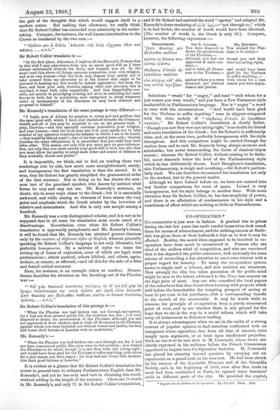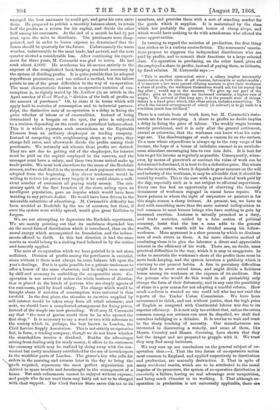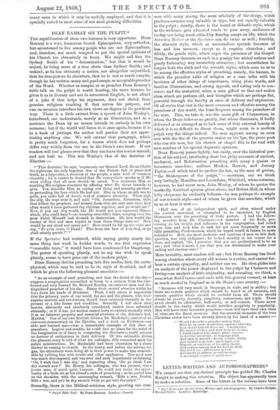CO-OPERATION.*
CO-OPERATION is just now in fashion. A gradual rise in prices during the last few years has made careful housewives look round them for means of retrenchment, and the striking success at Roch- dale has given them or their husbands a hint as to how it may be' effected. Besides, the moral ideas supposed to be involved in co- operation have done much to recommend it. Persons who are tired of the endless whirl of competition, and who are convinced that it has degraded the public conscience, look anxiously for some scheme of reconciling a due attention to one's own interest with a. proper regard for honesty. To many the co-operative system. seems to supply such a scheme, and new societies arc numerous. How strongly the idea has taken possession of the public mind. might be seen in the letters addressed to the Times last summer on the high price of meat. Any one who consulted the local papers. of the suburbs at that time found them teeming with projects which held before the householder the tempting prospect of saving at. least 25 per cent. in his purchases, with a corresponding benefit. to the morals of the community. It may be worth while to. examine the principle of co-operation from a purely economical point of view, and to see whether there is any ground for the. hope that we are in the way to a social reform which will take. away all inducement to dishonest trading.
It is always advantageous when we are in the midst of a strong current of popular opinion to find ourselves confronted with au. antagonist whose opposition, free from all bias of interest, rests. simply upon argument, or at least upon intellectual prejudice. Such an one is to be met with in M. Cernuschi, whose views are clearly expressed in his evidence before the French Commission. appointed to inquire into Co-Operative Societies. M. Cernuschi has placed his sincerity beyond question by carrying out an. experiment on a grand scale at his own cost. Ile had been struck by the success of the Equitable Pioneers and of the Grenoble Society, and, in the beginning of 1859, soon after free tradoits meat had been established in Paris, he opened three butchers' stalls in different parts of the city. Ho provided the cApital,
• ElluVe tier la Sakti. de Ca-Operation. Pp. 209-226. Parts. 1.666. engaged the best assistants he could get, and gave his own exer- tions. He proposed to publish a monthly balance-sheet, to retain half the profits as a return for his capital, and divide the other half among his customers. At the end of a month he had 2- per cent, upon the sales to distribute. The purchasers were disap- pointed, and in order to lessen expense he determined that the bonus should be quarterly for the future. Unfortunately the warm weather, unfavourable to the meat trade, had arrived, and the next quarter showed a considerable loss. After continuing his experi- ment for three years, M. Cernuschi was glad to retire. He had sunk about 4,000/. He attributes his ill-success entirely to the expense of the complicated book-keeping rendered necessary by the system of dividing profits. It is quite possible that he adopted superfluous precautions and too refined a method, but his failure points to one of the great difficulties in the way of co-operation. The most characteristic feature in co-operative societies of con- sumption is, as rightly stated by Mr. Ludlow (in an article in the April number of Good Worth?), "division of the bulk of profits on the amount of purchases." Or, to state it in terms which will apply both to societies of consumption and to industrial partner- ships, the distinctive note of co-operation is a delay in fixing the price whether of labour or of commodities. Instead of being determined by a bargain on the spot, the price is subjected to a revision depending on the result of a periodical balance-sheet. This it is which separates such associations as the Equitable Pioneers from an ordinary shopkeeper or trading company. Instead of competing with neighbouring shops as to price, they charge full rates, and afterwards divide the profits among their purchasers. We naturally ask whence these profits are derived. They are not due to getting rid of the shopkeeper, for interest must be paid on the capital employed in the concern, and the manager must have a salary, and these two items united make up trade profits. We must look elsewhere for the cause of the Rochdale success, and we shall find it in the system of cash payment which was adopted from the beginning. Any clever tradesman would be willing to reduce his prices very largely if he could obtain a suffi- cient number of customers all paying ready money. The mis- sionary spirit of the first founders of the store, acting upon an intelligent population, gave an impulse which would have been wanting to any private dealer. He would have been driven to the miserable substitute of advertising. M. Cernnschi's difficulty has been avoided at Rochdale by the use of counters, but these, if once the system were widely spread, would give great facilities to forgers.
We are not attempting to depreciate the Rochdale experiment. We are merely pointing out that its usefulness depended less on the novel form of distribution which it introduced, than on the moral energy which accompanied its foundation and the induce- ments offered to thrift. In this last direction it had the same merits as would belong to a sinking fund believed in by the nation and honestly applied.
The note of co-operation which we have pointed to is not alone sufficient. Division of profits among the purchasers is essential, since without it there must always be some balance left upon the year's dealings. But it is quite possible for a private tradesman to -offer a bonus of the same character, and he might even succeed by skill and economy in outbidding the co-operative store. Co- operation is not arrived at unless the whole business of distribu- tion is placed in the hands of persons who are simply agents of the customers, paid by fixed salary. The change which would be brought about if societies of consumption were universal is thus -twofold. In the first place, the stimulus to exertion supplied by self-interest would be taken away from all retail salesmen ; and next, we should have a complicated arrangement for fixing prices, instead of the simple one now prevailing. Well may M. Cernuschi say that "the man of genius would then be he who opened the lira shop." It is necessary to say a word or two with reference to the society which is, perhaps, the best known in London, the Civil Service Supply Association. This is not strictly co-operative but, in form, a trading company, though we do not know whether the shareholders receive a dividend. Besides the advantages arising from dealing only for ready money, it offers to its customers the economy which may be realized by doing away with the con- venient but costly machinery established for the use of housekeepers in the wealthier parts of London. The grocer's boy who calls for orders in the morning and returns later in the day to bring the rods required, represents the most perfect organization yet v de ised to spare trouble and forethought in the management of a \s\
house. But such refinements cannot be enjoyed without expense, and people who do not need them may fairly ask not to be charged with their support. The Civil Service Store saves this tax to its members, and provides them with a sort of standing market for the goods which it supplies. It is maintained by the class which has probably the greatest horror of cheap shops, and which would have nothing to do with a tradesman who offered the same opportunities.
In turning to regard the societies of production, the first thing that strikes us is a curious contradiction. The consumers' associa- tions propose to suppress the independent distributors who are paid by profits, and to commit their functions to a large salaried class. Co-operation in producing, on the other hand, gives all the employed a share in profits, instead of paying them, as hitherto, by fixed salaries. M. Cernuschi says :—
" This is another economical error ; a salary implies necessarily renunciation on both sides of all chances, favourable or unfavourable ; if to-morrow a law were passed obliging masters to give their workmen a share of profits, the workmen themselves would ask for its repeal tho day after ; would say to the masters, We give up our part of the profits ; give us in exchange an increased certainty, a higher rate of wages.' We arrived at that long ago ; it is the present state of things. Salary is a fixed price which, like other prices, includes everything. To attack the natural arrangement of salary (le solaria° is to go back to a condition much less civilized."
There is a certain basis of truth here, but M. Cernuschi's state- ments are far too sweeping. A share in profits no doubt implies a delay in fixing the price of labour. The weekly wages become merely provisional, and it is only after the general settlement, annual or otherwise, that the workman can know what his earn- ings are. The disadvantages of such a custom lie on the surface.
To a man whose expenditure is always up to the very verge of his income, the hope of a bonus of indefinite amount is an unwhole- some stimulant encouraging him to run into debt. It is best for him to get his income as regularly as possible. Consequently, when- ever, by means of piecework or contract the value of work can be determined beforehand, it is best to fix a definitive price. But where the value is uncertain, where it depends in great measure on the will and industry of the workman, it may be advisable that it should be tested by results. This is the case with a great deal of work paid by the day, especially such as is not subject to effectual supervision. Every one has had an opportunity of observing the leisurely demeanour of workmen engaged in casual house repairs. We know persons to whom the sight of carpenters or painters is for this single reason a sharp irritant. At present, too, we have to deal with something more than the mere natural indisposition to toil common to most human beings who have nothing to gain by increased exertion. Laziness is actually preached as a duty, and trade societies, misled by a false notion of political economy, insist that the less a man adds to the general wealth, the more wealth will be divided among his fellow- workmen. Mere argument is a slow process by which to disabuse man of such errors as these. A far more effective method of combating them is to give the labourer a direct and appreciable interest in the efficiency of his work. There are, no doubt, some practical difficulties in the way, which it is easy to exaggerate. In order to ascertain the workman's share of the profits there must be more book-keeping, and the system involves a publicity which is contrary to our present habits. A firm in pecuniary difficulties might fear to avow actual losses, and might divide a fictitious bonus among its workmen at the expense of its creditors. But the persons who would do this would in all probability only change the form of their dishonesty, and in any case the possibility of abuse is a poor reason for not adopting a needful reform. How much a reform is wanted no one could tell who has not read the reports of the Trades' Union Commission. We have been accustomed to think, and not without justice, that the high price of English as compared with Continental labour was due to its superior efficiency. It is now only too evident that, unless the errors common among our artizans can soon be dispelled, we shall find ourselves indulging in a delusion. It is unwise to wait and trust to the sharp teaching of necessity. Our manufacturers are interested in discovering a remedy, and some of them, like Messrs. Crossley and Messrs. Greening, have shown that they feel the danger and are prepared to grapple with it. We trust they may find many imitators.
We may sum up our conclusions on the general subject of co- operation thus :-1. That the two forms of co-operative action most common in England, and applied respectively to distribution and production, are mutually destructive. 2. That in spite of many accidental merits, which are to be attributed to the moral impulse of its promoters, the system of co-operative distribution is. essentially a failure, having no real advantage over competition, and being much clumsier in its working. 3. That although co- operation in production is not universally applicable, there -are
many cases in which it may be usefully employed, and that it is specially suited to meet some of our most pressing difficulties.
































 Previous page
Previous page